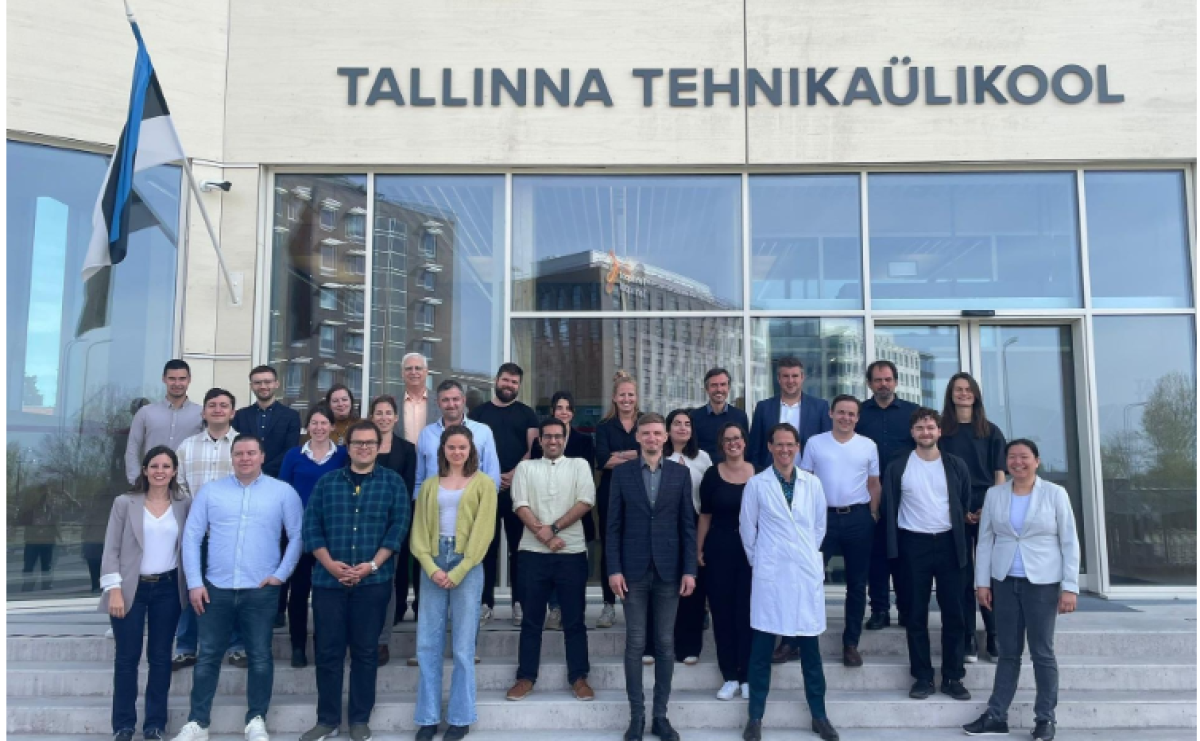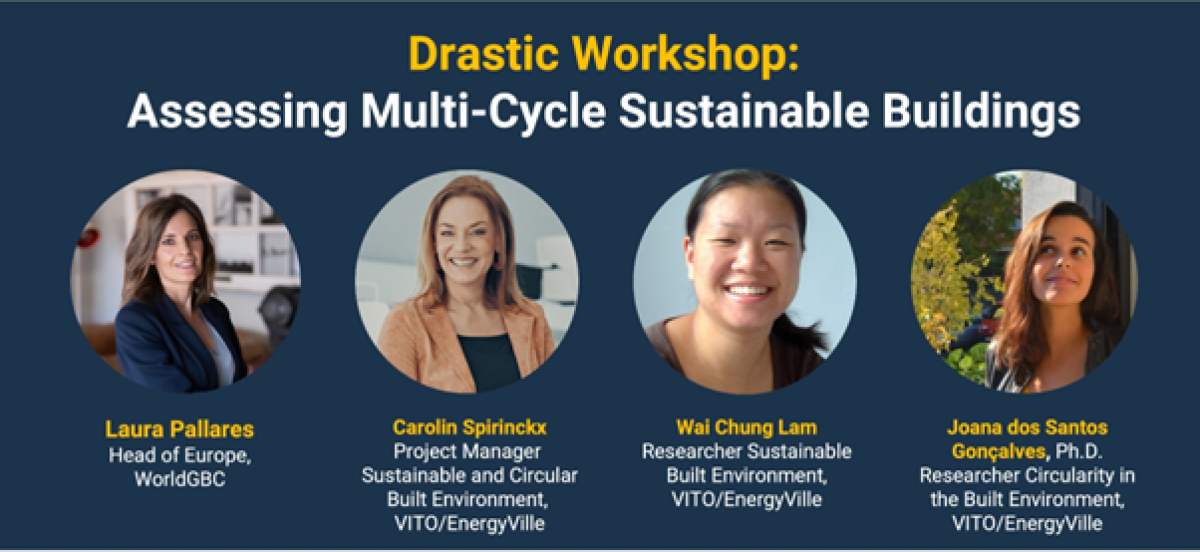Drastic Newsletter June 2024
Welcome to the spring 2024 edition of the Drastic project newsletter, a space for project news and progress updates.
Working with 23 partners across eight European countries, Drastic is a four-year project which aims to reduce whole life carbon and increase circularity across the European built environment, supported by the European Union (EU) under grant number 101123330.
Through five ‘Demonstrator’ pilot projects, Drastic aims to showcase varied and innovative solutions to reduce whole life carbon (WLC) and the climate impact of construction across the entire value chain in Europe, whilst increasing and improving circularity within the built environment.
The Drastic Demonstrators will target different layers of buildings, to achieve reduction of operational and embodied carbon emissions and foster material reclamation and reuse. Drastic aims to show how these solutions, combined with improved business models, can lead the way towards a whole life cycle decarbonisation of EU building stock by 2050.
Visit the Drastic project website to learn more about the project, its Demonstrators and partners.

Latest news
Drastic National Workshop and General Assembly

Drastic National workshop and GA
On 14 May, Drastic project stakeholders gathered in Tallin, Estonia, for a three-day event combining a national project workshop and the first Drastic General Assembly.
Project partners and Estonian Demonstrator project leads, Taltech and Timbeco, hosted the first Drastic national workshop to kick off event proceedings. The dynamic workshop engaged and informed Estonian stakeholders of Drastic's aims to reduce total building life cycle impacts and increase circularity across the European built environment via its five Demonstrators.
Workshop speakers included Michiel Ritzen (Senior Expert Circularity/Project Manager Sustainable Built Environment at VITO), Miles Rowland (Policy Coordinator at World Green Building Council) and Ivo Jaanisoo (Deputy Secretary General for Living Environment and Circularity at Kliimaministeerium/Ministry of Climate of Estonia).
The Drastic General Assembly’s comprehensive agenda comprised workshops, deep dives and discussions on a range of topics, including:
- the project’s guidance framework for building products, as well as on individual project work streams and how they interlink.
- the future of circularity, whole life carbon and innovation within the European buildings and construction sector.
- updates on each of Drastic's five European Demonstrator projects.
Attendees also made visits to the Timbeco factory and Estonian Demonstrator site as part of the event.
The next Drastic General Assembly will be held in Germany later this year. Watch this space for further announcements!

Meet the Demonstator
Estonia Demonstrator
Currently, 82% of dwellings in Estonia have a low energy performance, with no established ecosystem to provide and apply the prefabricated facade elements that would facilitate deep energy retrofits to such buildings.
Drastic’s Estonian Demonstrator aims to address the low energy performance of these buildings via deep energy retrofits and renovation to their skin and service layers. The goal of the Estonian Demonstrator is to validate a complete deep energy renovation of an existing apartment building, thereby reducing the building’s energy consumption by approximately 50%. The selected building for this Demonstrator is a three-storey apartment block located in Rapla, Estonia.
The Estonian Demonstrator is led by Timbeco, in collaboration with the Tallinn University of Technology (TalTech). Timbeco is a modern factory based in Tallinn, Estonia, specialising in the customised production of energy-efficient timber frame elements, element buildings and modular houses. TalTech will bring their research expertise to the Estonian Demonstrator to test hygrothermal performance, indoor climate, energy performance, mechanics, fire resistance, and product durability.
Via a new method of disassembly and reassembly of wall and roof panels, the Estonian Demonstrator hopes that its circular practices will be commercially exploited as a viable solution for the renovation of Northern-European apartment buildings. This Demonstrator has a high level of replicability, both across Estonia and in other North-Eastern European countries.
Read more about Drastic’s Demonstrators on the Drastic website.

Recent project activities
Assessing Multi-Cycle Sustainable Buildings Online Workshop

Drastic Workshop: Assessing Multi-Cycle Sustainable Buildings
On 23 April, Drastic hosted a virtual workshop ‘Assessing Multi-Cycle Sustainable Buildings’ with diverse stakeholders to discuss Drastic’s assessment and guidance framework for building products and buildings.
Drastic aims to demonstrate a circular building approach on a full building scale, which extends beyond material circularity. It includes the circular flow of these materials and products from planning to end-of-life, taking into consideration all value chain factors as well as policies that support implementation and economic value creation.
Developing process and design guidelines which consider multi-cycle sustainability, circularity, sufficiency, and life cycle costing indicators in a common performance assessment framework is one of the strategic goals of the Drastic project.
With moderation from VITO colleagues Joana dos Santos Gonçalves, Wai Chung Lam and Carolin Spirinckx, and additional support from Laura Pallares at WorldGBC, the workshop highlights included interactive discussions and break-out sessions which held a particular focus on multi-cycle Life Cycle Assessment (LCA), multi-cycle Life Cycle Costing (LCC), sufficiency and circularity indicators and results state-of-the-art analysis.
Attendees discussed the importance of designing for multi-lifespan products and buildings, how the circular economy extends beyond waste reduction through recycling, and how alignment across the industry on strategies such as the 9R model could be the key to unlocking future sustainable and circular practices.
Click here to view the workshop plenary session.

International events
Drastic at the World Circular Economy Forum 2024
In April, Drastic was featured as part of this year’s World Circular Economy Forum (WCEF) in Brussels. The WCEF is one of the world’s leading events for circular economy thinkers, doers and leaders, showcasing the most impactful circular solutions from around the world.
In collaboration with the Circular Buildings Coalition (CBC), Drastic hosted a lunchtime workshop: ‘Accelerating circularity from a sufficiency perspective’. The built environment is one of the sectors with the highest circularity potential, but current circular strategies focus mainly on the more applied R-strategies (e.g. recycling and reuse). The workshop applied sufficiency on different circular solutions in the construction industry, aiming at the lesser applied R-strategies (e.g. refuse and reduce).
With moderation from VITO colleagues Michiel Ritzen and Joana dos Santos Gonçalves, and additional support from Laura Pallares and Carolina Montano Owen from the World Green Building Council (WorldGBC), discussions focused on the potential of sufficiency in driving circular solutions within the construction industry.
Via engaging case studies from the CBC (an initiative supported by the Laudes Foundation and WorldGBC) and the Drastic project, participants actively collaborated in a world café setting, igniting creativity and fostering sustainable change, exploring the often-overlooked refuse and reduce strategies and paving the way for systemic innovations.
Click here to view the workshop factsheet at the bottom of the page

Upcoming events
CEN/TC 350
20 June 2024, Stockholm
Drastic will present its multicyclic assessment framework as part of the CEN/TC 350 Plenary meeting.



